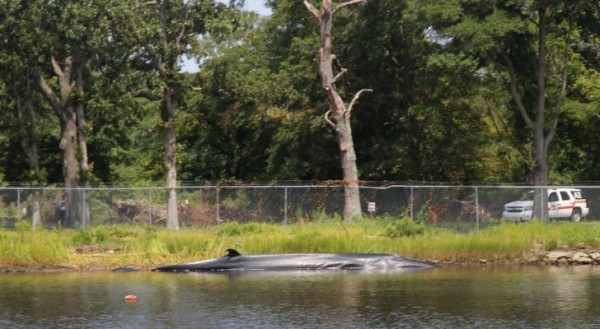This past August, biologists from the Virginia Aquarium and Marine Science Center Stranding Response Team were notified of an unusual sighting in the Elizabeth River, a busy, industrial tributary of the Chesapeake Bay. A 45-foot long female sei whale was spotted floating up river, far away from its normal habitat in the Atlantic.
Aquarium research coordinator Susan Barco told National Geographic that the sighting was odd, and that the whale was “in the wrong place at the wrong time.” The team soon noticed the unusual disoriented behaviour of the sei whale. Worried that the whale may collide with an oncoming ship, the team tried their best to follow her upstream in an effort to protect her. But despite the effort, the whale was found dead a few days later.
Not surprisingly to the team, a necrospy revealed an unsettling truth about the sei whale’s death: a small, sharp piece of plastic had been lodged in her stomach, preventing her from being able to eat properly. Furthermore, the whale’s vertebrae had been fractured by a run-in with a ship.
Perhaps the saddest part about this story is that the death of the whale could have been prevented providing someone had disposed of their garbage properly. The plastic was identified as a broken DVD case.

A necropsy revealed a shard of a DVD case (at left) in the stomach, which prevented the whale from feeding. The floating piece of debris had not been “disposed of properly,” and caused a preventable death, said a marine biologist. Photograph credit: Virginia Aquarium & Marine Science Center
Sei whales are an endangered species, according to the Office of Protected Resources. During the 19th and 20th centuries, sei whales were targeted and greatly depleted by commercial hunting and whaling, with an estimated 300,000 animals killed for their meat and fats. Today these whales and other marine life still face problems, as trapping debris, garbage, and other floating surface material can easily entangle them or become lodged in their stomachs, as witnessed recently with the sei whale death outside of Virginia.
A 2014 study found that ingestion of debris has been documented in 56 percent of cetacean species, with rates of ingestion as high as 31 percent in some populations. Frances Gulland, a senior scientist with the Marine Mammal Center in Sausalito, California, told Nat Geo that the whales that wash up on shore only make up a small percentage of the total whales killed off by ocean debris.
Gulland also explained how sperm whales are some of the most susceptible species to swallowing garbage, as they often mistake debris for their primary food source, squid.
“Every sperm whale that I have necropsied has had a lot of nets and pieces of plastic in its stomach,” she says.
One of the most tragic cases Gulland came across happened in 2008, when two sperm whales were found stranded along the northern California coast. Their stomachs were found to be full of a variety of objects, including net, rope and various plastic garbage debris. One animal had a ruptured stomach, the other was completely withered, with over 400 pounds of debris trapped in its stomach. Sadly, both cases proved to be fatal.
NOAA Fisheries Southeast marine mammal stranding coordinator Blair Mase says the number of whales and dolphins impacted by floating marine debris seems to be on the rise.
Taking Responsibility For Your Trash
In order for tragic situations like these to be prevented, it requires that each of us step into and accept our social responsibility as a conscious human being on this planet.
Garbage decomposes at wildly different rates. For instance, a banana peel takes about a month, while rubber takes about 70 years and a plastic holder can take 500 years. Landfills are dirty, smelly eyesores that are quickly becoming overcrowded and releasing methane gas into the atmosphere, while incineration releases carbon dioxide and other pollutants into the air.
With the proper disposal methods, you can reduce your garbage impact while effectively removing it from your life. Misty Witenberg at eHow has put together a simple list of steps in properly disposing your garbage. Take a look:
Proper Waste Disposal Tips
1) Sort your garbage into a few different bins. This can be done quickly by setting up a multi-storage bin in your kitchen so items can be sorted as they are disposed.
2) Bring any garbage that can be reused, such as toys or clothing, to a secondhand store to be resold.
3) Take recyclables such as glass, plastics and paper to a local recycling center. If your neighborhood has a recycling pick-up, leave it out in the front of your house in plastic bins. Don’t use plastic garbage bags as this only contributes to the waste.
4) Turn food and garden waste into compost. You can do this with a simple compost pile, or speed things up with a compost bin filled with worms that will digest the trash and do the work for you. Once it’s completely composted, you can use it in your garden as a rich fertilizer.
5) Collect any remaining garbage into a trash bag and place it into a garbage bin. Remember to seal the top so that animals won’t be able to get into it. Leave the bin in sight for garbage collectors on your pick up day.
Other tips:
Use large, empty mason jars as your refillable water bottle or smoothie container.
Oil based paint is considered hazardous waste and should be disposed of at a Household Hazardous Waste Facility. Some communities have locations that you can make drops at whenever you want, while others only have set times when hazardous waste materials are accepted.
Never flush kitty litter down the toilet as specific, harmful bacteria can pollute our water.
Medicine take-back programs for disposal are a good way to remove expired, unwanted, or unused medicines from the home and reduce the chance that others may accidentally take the medicine. Contact your city or county government’s household trash and recycling service to see if there is a medicine take-back program in your community.
Do you have any other tips on proper waste disposal? Please share with us below!






Leave a reply